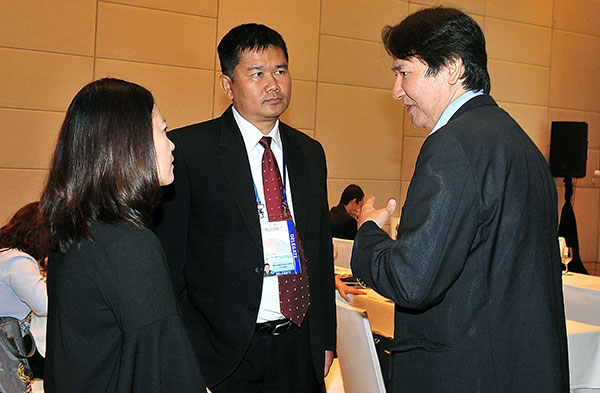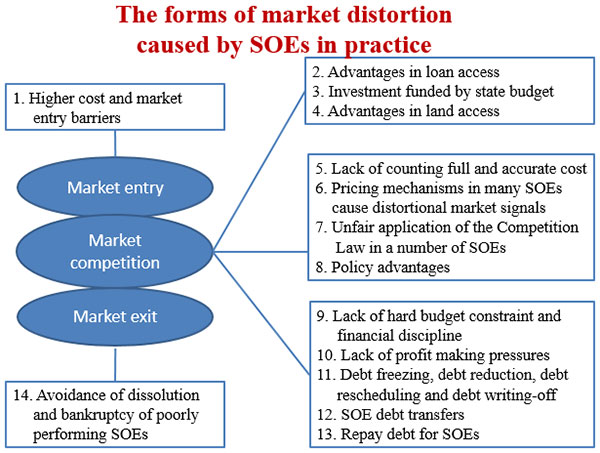APEC officials urge Vietnam to break SOE dominance
 |
Warren Mundy, managing director of Australia’s BlueStone Consulting Pty., Ltd. and former commissioner of Australian Productivity Commission, told VIR that, “In Vietnam, state-owned enterprises dominate many important markets, such as electricity, gas, oil, minerals, telecommunication services, domestic air transportation, credit financing, and railways. That is unfair for private firms.”
Mundy formerly worked with the Vietnamese Central Institute for Economic Management (CIEM) on economic reform.
According to experts, private firms in Vietnam find it difficult to join these markets as they lack the favourable business conditions of the SOEs and do not have the scale or resources to take up the gauntlet in a fair competition. That is why many SOE-dominated fields lack competitiveness.
“Transparency, openness, and a strong commitment of robust SOE and institutional reforms are central to ensuring a level playing field for all enterprises.This would also help Vietnam lure in more foreign direct investment (FDI),” Mundy said on the sidelines of yesterday’s workshop on the economics of competition policy at the on-going APEC First Senior Officials’ Meeting and Related Meetings in the south-central city of Nha Trang.
Rory McLeod, the chair of APEC’s Economic Committee and director of New Zealand’s Ministry of Business Innovation and Employment, also told VIR that if the Vietnamese government wants to attract more private investment, it should give more space for private firms and rein in SOEs.
“In New Zealand, private firms and SOEs are competing on the same playing field and SOEs receive almost no privileges from the government. In Vietnam, the economy’s competitiveness is undermined by ineffective SOEs,” McLeod said.
Experts also warned that if the Vietnamese government continues “overindulging” SOEs without paying due attention to private enterprises, it will be difficult to improve the economy’s overall competitiveness.
And without competition, SOEs are free to indulge in business as usual. Many SOEs have been suffering losses, such as Cienco 5, five out of Electricity of Vietnam’s 50 companies, 11 out of PetroVietnam’s 31 companies, seven out of Urban Infrastructure Development Investment Company’s 24 companies, and six out of Vinacomin’s 57 companies.
Meanwhile, in Vietnamese private firms—almost exclusively small- and medium-sized enterprises—are playing an important role. They make up 97 per cent of the country’s total enterprises and produce 41 per cent of its GDP, 33 per cent of the state budget, and 77 per cent of employment.
According to CIEM director Nguyen Dinh Cung, the Vietnamese government has attempted to relegate SOEs to the same regulatory framework as the private sector.
“Nevertheless, the state has created many advantages and privileges for SOEs in several areas,” Cung said. “The state is creating technical barriers for private enterprises, while providing itself with competitive advantages by resource allocation and rescuing many SOEs.”
For instance, the existing laws and regulations on land assignment and rent for business and production do not discriminate between SOEs and non-state enterprises. However, SOEs hold 70 per cent of land dedicated to production and business purposes.
According to Cung, under the umbrella of the state, SOEs have been causing various forms of market distortions (see chart).
 |
| The forms of market distortion caused by SOE practices |
What the stars mean:
★ Poor ★ ★ Promising ★★★ Good ★★★★ Very good ★★★★★ Exceptional
Latest News
More News
- MoF Deputy Minister receives Special Advisor of Japan-Vietnam Parliamentary Friendship Alliance (March 13, 2025 | 16:34)
- Vietnam and Singapore to build legal framework for capital markets and digital assets (March 13, 2025 | 11:09)
- Wood exporters wary about surging tariff pressures (March 13, 2025 | 10:16)
- Pacifico Energy eyes major wind energy investments in Vietnam (March 13, 2025 | 10:14)
- Ho Chi Minh City looks to develop potential of Saigon River (March 12, 2025 | 13:34)
- Vietnam and Singapore to enhance economic connectivity (March 12, 2025 | 11:43)
- National Assembly Standing Committee approves 30 per cent land rent cut (March 11, 2025 | 16:25)
- Vietnamese corporations cooperating with Indonesian companies (March 11, 2025 | 11:44)
- VinFast supercharges EV growth in Indonesia (March 10, 2025 | 17:31)
- ofi Vietnam's commitment earns recognition at WEPs Awards (March 10, 2025 | 08:00)

















 Mobile Version
Mobile Version